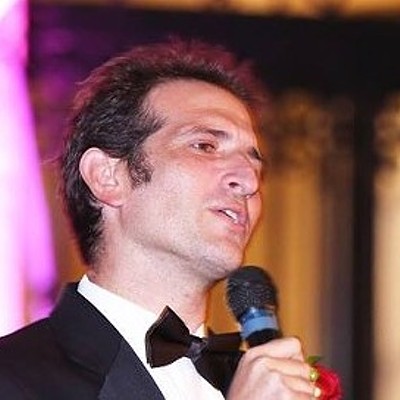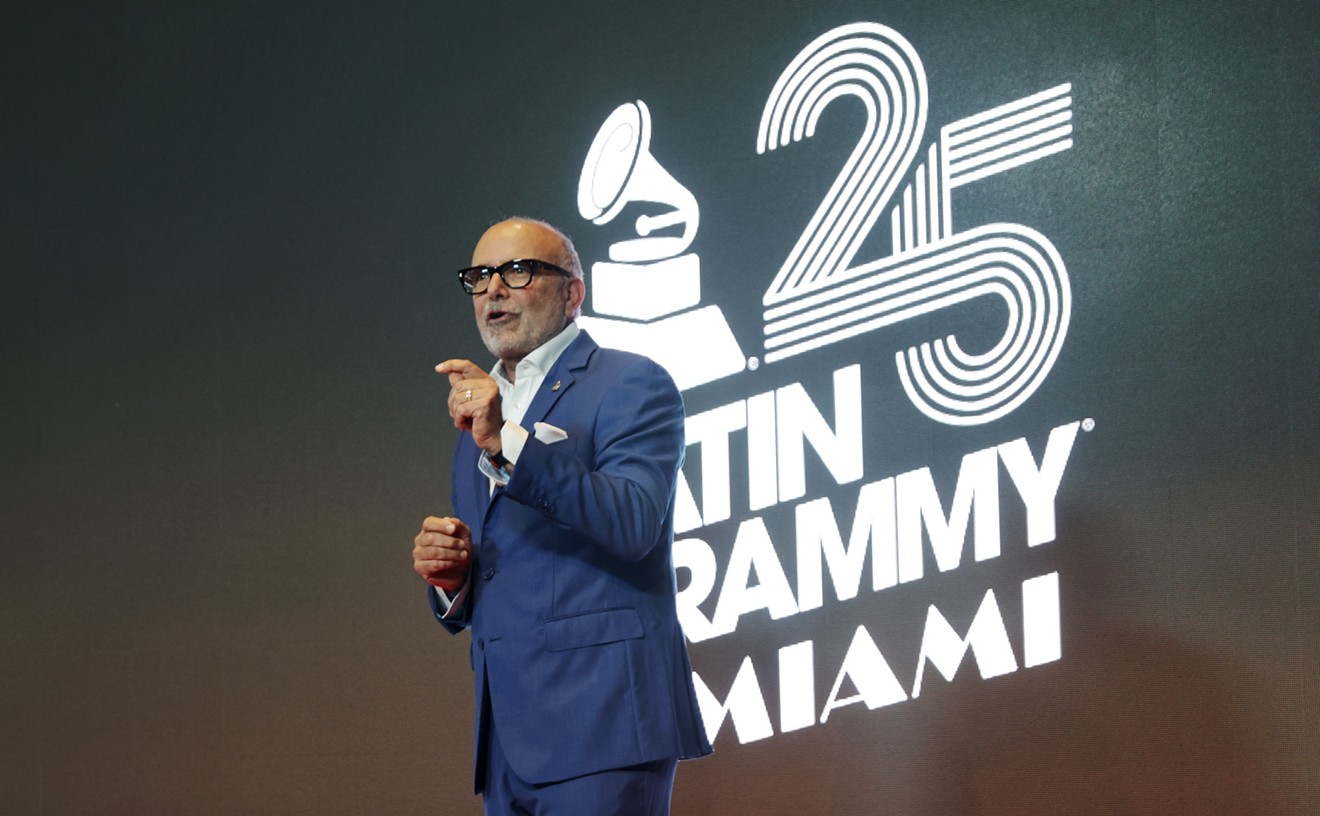When you think of Amy Winehouse, you probably think of England, the origin of her British accent; New York, the inspiration for her jazzy instrumental backings; or even Detroit, the source of the Motown influence found on her biggest hit, "Rehab." You might not guess that Miami played a role in Winehouse's sound. But a massive portion of the music she released in her much too brief life was recorded in the Magic City, because Winehouse's label paired her with local producer Salaam Remi.
Remi's engineer, Gary Noble, remembers the day in 2003 when a 19-year-old Winehouse walked into Creative Space, a downtown studio near the old Miami Herald building, for the sessions that became her debut album, Frank. "She came in with a guitar on her back and a bag filled with CDs with everything from Sarah Vaughan to Nas," Noble recalls. "I was setting up the studio while Salaam was talking to her, asking her what songs she had. Most artists would put on a CD of their demo. She sat down, opened up her guitar case, and played live. I was behind the console connecting wires, and I had to stop what I was doing. I was like, That voice is coming out of her?"
During those sessions, Winehouse recorded tracks such as "I Heard Love Is Blind" and "Fuck Me Pumps." Noble continued to be impressed by her work ethic. "She had the same headspace in the studio as she did live. She acted like she was onstage all the time. She never sang with the lyrics in front of her and wouldn't sing the song the same each time," he says. "Each performance came from how she was feeling."
Instead of "punching in" the song — a process of recording each line of a song separately, to be stitched together by producers later, used by most modern-day singers — Winehouse preferred to sing a song all the way through, from top to bottom. Her songwriting process was also consistent. "She'd come up with chords and then melodies, concepts, and lyrics for a song. She'd go into the lounge for an hour on her guitar or Wurlitzer and come back with a whole song," Noble recalls.
But like most young people, Noble says, Winehouse also had a playful, mischievous side. "Near the end of Frank, we were doing the final overdubs, and Salaam told her to take a break. She was supposed to rest her vocal cords, but the next thing we hear are the sounds of a trumpet. She wanted to learn how to play. We had to tell her to stop."
After she found celebrity, Winehouse returned to Miami to party and even married her husband, Blake Fielder-Civil, in Miami Beach in 2007. But during these recording sessions, the singer lived a quieter life, Noble says. "She loved the Cuban restaurants. The Cheesecake Factory in the Grove was a favorite. She was like, 'Are you trying to kill me with these servings? These are three servings back home.' There was one night she took me and Nick [Shymansky, her manager] to see the movie City of God at a theater on South Beach. She's like, 'You have to see it! Find out the next showing.'"
Frank found success internationally, but Winehouse was still relatively unknown stateside when she returned to Miami in 2005 to record five songs at Instrument Zoo Studios for her breakout album, Back to Black. Frank Socorro was the engineer on the five songs Remi produced: "Tears Dry on Their Own," "Some Unholy War," "Me & Mr. Jones," "Just Friends," and "Wake Up Alone."
"She was in Miami only for ten days for Back to Black." Socorro says. "Her vocals were quick. She'd give a couple takes that were effortless and honest, and we'd have it. People think of studio sessions as all-nighters, but we'd get there at 10 a.m. to set up; she'd come at noon. By 8 or 9 at night, we were done and we'd be back up in the morning getting it done in the daylight."
Socorro quickly became an admirer. "Every time she opened her mouth to sing, it was amazing — the weight she gave her emotions. To this day when I hear 'Tears Dry,' I get a lump in my throat."
The recording process of Back to Black was intimate, consisting of Winehouse singing while on guitar and then adding the other instruments played mostly by Remi or instrumentalist Vincent Henry. During that time, Socorro says, Winehouse behaved nothing like the tragic, intoxicated figure portrayed in the tabloids. "Amy took the studio seriously. She had a lot of respect for the creative process and people's time. The person in the papers and TV, I didn't know that person."
There wasn't much downtime during these sessions, but Winehouse still cooked everyone dinner. She fell hard for the food at Garcia's Fish Market on the Miami River. Socorro remembers her talking about what she liked about Miami. "Like most British people who come here, she loved the sun," he says. "She loved reggae, so Miami having that island vibe was something she was into."
About a year after these Miami sessions, coupled with six songs produced by Mark Ronson in other locales, Back to Black was released and quickly became a phenomenon. It sold millions of copies and won five Grammys. Winehouse continued to work with Remi as producer, but not in Miami. Socorro and Noble were summoned to London and St. Lucia in 2007 for further sessions that were released posthumously as Lioness: Hidden Treasures.
Noble worked with Winehouse again, in Jamaica in 2010, a year before her death from alcohol poisoning in 2011 at the age of 27. In addition to the obvious tragedy of the loss of a young life, an added regret for Noble was how much music she had ahead of her. "In Jamaica, she showed me three composition books that were filled. Notebooks full of songs — some were completed; a lot were poems. She sang me pieces. One was about her nana, who she was close to, who had passed away."
When the movie Amy came out, winning a 2016 Academy Award for best documentary, Noble and Socorro couldn't bring themselves to see it. They were interviewed for the film, but their footage didn't make the final cut. "I guess they felt what we said wasn't relevant," Noble says. "It wasn't reality TV stuff about her I was talking about. I wanted to pay homage to her memory."
Noble and Socorro continue to work in South Florida in the music business. Noble has recently mixed recordings by Chronixx, and Socorro teaches at SAE Institute. They both look back with fondness and appreciation at their time in the studio with Winehouse.
"The young students who were kids when it came out still ask me about it. I'm immortal because of that album," Socorro says. He continues to take lessons he learned from Winehouse's sessions into the studio. "When I work with vocalists now, I try to get them to sing it all out like Amy did instead of getting every line perfect. You get more emotion out of it."
These days, the sound of Winehouse's voice takes Noble back to his time with the singer in St. Lucia, where they ate breakfast every morning at the same restaurant on the water.
"One morning, she saw all these local kids hanging outside. She invited them in and told them, 'Order whatever you want,' and she put it on her tab. The restaurant wasn't happy with all these dirty, malnourished kids coming in. I'll never forget that. And with all the paparazzi, why didn't we see pictures of that online? Not to say she didn't have her demons, but her Miami extended family knew another side of her."
[
{
"name": "Air - MediumRectangle - Inline Content - Mobile Display Size",
"component": "19274298",
"insertPoint": "2",
"requiredCountToDisplay": "2"
},{
"name": "Editor Picks",
"component": "17482312",
"insertPoint": "4",
"requiredCountToDisplay": "1"
},{
"name": "Inline Links",
"component": "18711090",
"insertPoint": "8th",
"startingPoint": 8,
"requiredCountToDisplay": "7",
"maxInsertions": 25
},{
"name": "Air - MediumRectangle - Combo - Inline Content",
"component": "17482310",
"insertPoint": "8th",
"startingPoint": 8,
"requiredCountToDisplay": "7",
"maxInsertions": 25
},{
"name": "Inline Links",
"component": "18711090",
"insertPoint": "8th",
"startingPoint": 12,
"requiredCountToDisplay": "11",
"maxInsertions": 25
},{
"name": "Air - Leaderboard Tower - Combo - Inline Content",
"component": "17482313",
"insertPoint": "8th",
"startingPoint": 12,
"requiredCountToDisplay": "11",
"maxInsertions": 25
}
]











